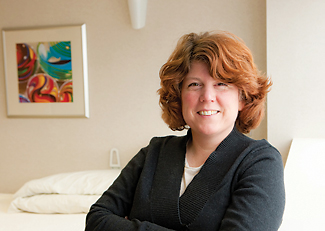Growing up in a small farming community in the ’70s, Lori Kempf didn’t have access to many outlets for entertainment. Her television only got 4 or 5 channels but one of them aired baseball games, so she began joining her father in watching America’s favorite pastime. Eventually she took interest in baseball cards and became an avid collector.
For Kempf, who is clinical subjects coordinator with the U-M Sleep Disorders Center, collecting has remained as one of her hobbies. Her current interest is costume jewelry from the ’50s and ’60s, and one of her favorite items is a dog brooch she purchased from a collector in England.

Photo by Scott Soderberg, U-M Photo Services.
“I just pick up whatever looks interesting because I like to learn,” she says.
Kempf enjoys unlocking the history of antique items she collects. She has loved history since 10th grade when she had a teacher whose passion for the subject ignited hers. Collecting antique items that people used in daily life has helped her grasp social histories that fill in blanks left by textbooks that only describe major world events, she says.
Kempf has worked at U-M 16 years, the last year and a half in the U-M Sleep Disorders Center. In her current position she oversees research participants in two sleep studies about women with high blood pressure during pregnancy and children with repaired cleft palates.
She recruits research participants from U-M clinics, and coordinates aspects of their enrollment and participation, such as obtaining informed consent and scheduling testing. She sees that they’re paid and informed of study results afterward.
Kempf also ensures that both the participants and the research team comply with protocol. She informs the Institutional Review Board of any adverse events, and drafts new amendments to the protocol and consent forms.
Hearing positive feedback from patients is one of her greatest satisfactions. She recalls the story of one participant in the study on pregnant women who said she felt her baby kicking more after the study treatment, which the woman attributed to the fact she was sleeping better.
Kempf rekindled her love of baseball by attending Tiger’s games at Comerica Park. She hadn’t spent much time in Detroit, but going to games and seeing the sights on her way in and out of the city showed Kempf there was more to learn.
In the company of her sister, Jill, Kempf soon began making regular visits to Detroit to visit attractions like restaurants and museums. The sisters went on the Tour De Troit bike tour, a 30-mile ride through the city streets with checkpoints like the Heidelberg Project and Belle Isle.
“The bike tour was a really good experience because you’re able to explore,” Kempf says. “If you’re in a car you aren’t able to pay as much attention.”
Spending time exploring the city has motivated Kempf to give back by volunteering with Proliteracy Detroit. She trained to teach reading and writing to illiterate adults.
Kempf went back to school as an adult and says learning later in life really helped her to understand the value of an education, so she is eager to begin working with this population.
“I’ve worked with people before who don’t know how to read and it seems really restricting. I think it makes life a lot harder for them,” Kempf says. “I’ve read some statistics and illiteracy is tied to crime and poverty and I think that’s a good place to start. … I just want to help.”
The weekly Spotlight features staff members at the university. To nominate a candidate, please contact the Record staff at [email protected].

